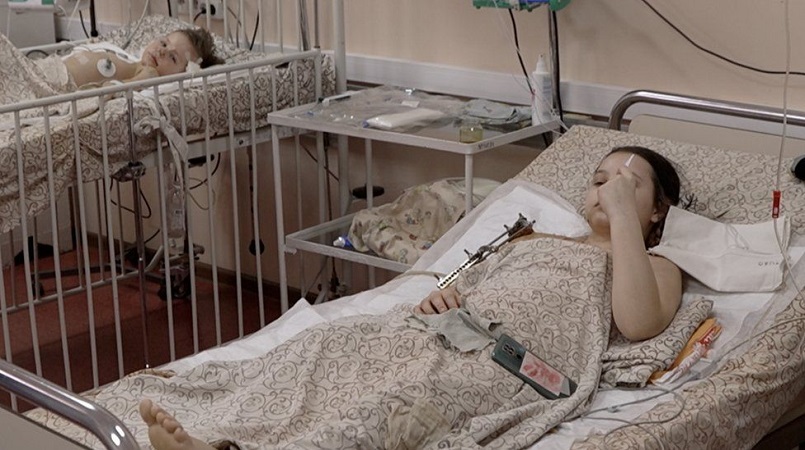
In his hospital bed, little Artem stares into space.
He clutches a small yellow toy tractor but says nothing as specialist nurses monitor his condition. The Russian shell that blasted shrapnel into his belly also badly wounded his parents and grandparents as they tried to flee Mariupol. A victim of Putin's war and he's not yet three years old.
In the next bed to Artem lies 15-year-old Masha, also from near Mariupol. Her right leg was amputated after it was torn apart by the blast from a Russian shell last Tuesday.
The very worst of Vladimir Putin's war in Ukraine and what the relentless Russian bombardment has done to the people trapped in the besieged city of Mariupol, can be seen at the Regional Children's Hospital in the nearby city of Zaporizhzhia.
Hundreds of people have been evacuated here. Their physical wounds are obvious and may, to an extent, heal. The psychological trauma will live with them forever.
Doctors here and the children's surviving relatives, asked us to tell their stories, among them Dr Yuri Borzenko, head of the Children's Hospital. He can't hide his contempt for what Russia has done.
"I hate Russia," says Dr Borzenko, without a flicker of emotion on his face. "The girl who lost her leg (Masha) was so traumatised she wouldn't eat or drink for days. She couldn't mentally handle what had happened. We had to feed her intravenously."
"Another boy," says the doctor, "a six-year-old, with shrapnel in his skull described - without any tears or emotion - watching his mother burn to death in their car after it was hit. Two days later he said 'dad buy me a new mum, I need someone to walk me to school'."
What is happening in Mariupol is a humanitarian disaster, even - perhaps - a war crime. An estimated 90% of the city's buildings have been damaged or destroyed. After last week's destruction of a theatre where more than 1,000 people were sheltering, reports today that an arts school, with 400 people inside, has also been attacked.
Those who've been able to escape Mariupol talk of unimaginable horrors. First-hand accounts of bodies lying in the streets, of homes destroyed. Carrying those memories they put as much physical distance as they can between themselves and what they went through.
In a café in the central city of Dnipro, which itself has come under Russian fire, we met Oksana Gusak. With her husband Andrii, and her parents, Oksana fled Mariupol last week through mined roads and a dozen hostile Russian army checkpoints.
Just drinking a glass of water now feels like a luxury for Oksana, after they had run out of everything in Mariupol. They all politely turn down our offer of coffee, saying it would be an insult to the family members they left behind in parts of Mariupol from where it was impossible to flee.
Her husband, Andrii, told me there was no water supply in the city, no power, no heating and no communications so they had no choice but to go.
